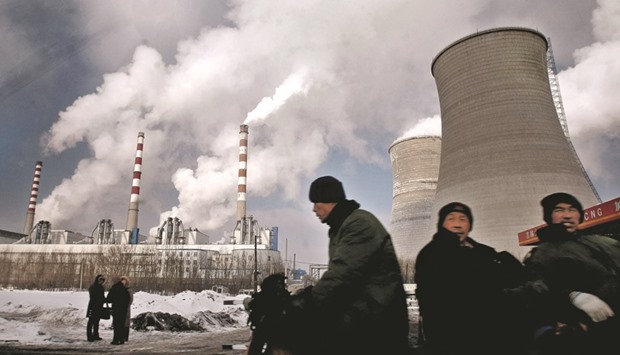China aims to keep energy consumption within 5bn tonnes of standard coal equivalent by 2020, it said in its five-year plan published yesterday, marking the first time the world’s second-biggest economy has set such a target.
China has long been considering an energy consumption cap in a bid to improve industrial efficiency, tackle smog and control greenhouse gas emissions, which are the highest in the world. Beijing is also pushing structural reforms to decouple economic growth from energy consumption.
“Energy consumption will be less than 5bn tonnes if China’s structural adjustment goes smoothly,” said Xi Fengming, an expert on carbon emissions at the China Academy of Sciences, adding that the planned launch of a nationwide carbon emissions market next year would make it easier to achieve.
However, with energy demand growth already slowing considerably and China overshooting its 2011-2015 energy efficiency targets, there might have been room to lower the number further, researchers said.
Yang Fuqiang, senior advisor at the US-based think tank, the Natural Resources Defense Council, said the 5bn figure was calculated by combining China’s 6.5% economic growth projections for 2016-2020 with its target to cut energy intensity by 15% over the same period.
“Based on my experience the government plans are conservative,” he said. “There could be a higher 18% cut in energy intensity, and that means energy consumption could be kept at about 4.8bn tonnes.”
The China Energy Research Society (CERS), a think tank, said in a report published last week that it expected energy consumption to reach 4.8bn tonnes of standard coal by 2020 and rise to 5.3bn tonnes by the end of 2030.
“We should see this (5bn tonne) target as a ceiling rather than a floor,” said Zhou Dadi, an energy policy researcher at CERS. “Maybe we can achieve better results.”
Total energy consumption was 4.3bn tonnes of standard coal in 2015, up 0.9% from the previous year, according to the most recent data from the National Bureau of Statistics. The average annual growth rate was 2.3% over 2012-2015, down from 6.4% in 2005-2012, the bureau said.
With China determined to curb pollution and emissions, experts expressed disappointment at the failure to include a coal consumption cap.
Coal consumption in China fell 2.2% last year as a result of stricter pollution controls as well as a downturn in demand.
In a separate report published ahead of the opening of the full session of parliament yesterday, the National Development and Reform Commission promised to limit growth of coal production and coal-fired power generation this year.
China is aiming to eliminate as much as 500mn tonnes of surplus coal capacity from the market in the next five years.
China also aims to cut carbon intensity - the amount of emissions per unit of GDP growth - by 18% over the same period. As part of its global climate change commitments, China has already pledged to reduce carbon intensity to 40-45% below 2005 levels by 2020.

A coal-powered power station in Shanghai. China’s total energy consumption was 4.3bn tonnes of standard coal in 2015, up 0.9% from the previous year, according to data from the National Bureau of Statistics.
